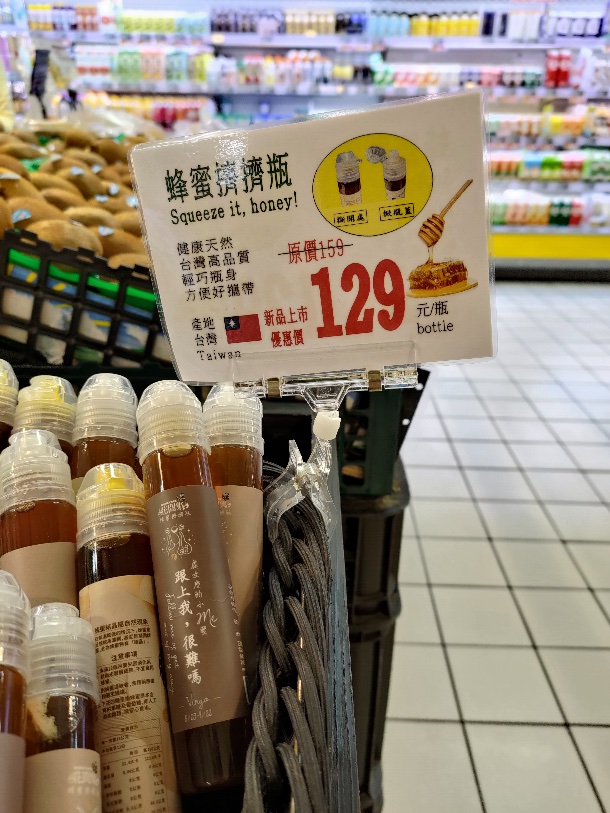Commas matter, Oxford and otherwise
« previous post | next post »
Mark Swofford took this photo yesterday in a Taipei supermarket:
The big Chinese characters at the top left say:
fēngmì jǐ jǐ píng
蜂蜜擠擠瓶
"honey squeeze bottle"
I'm a fan of commas, especially of the Oxford / serial comma, but ya gotta be careful not to use too many commas. Don't use them where they are unnecessary or where they will cause confusion, and make an effort to distinguish between commas and semi-colons. Language Log has paid a great deal of attention to commas from the very beginning (see the "Selected readings" below).
Selected readings
- "Biden's comma" (2/01/07)
- "Why commas count" (11/22/18)
- "Annals of comma placement" (11/30/10)
- "On leaving left" (10/13/08) — in the comments
- "Fun with commas" (8/7/15)
- "The indubitable equivalent of such claims" (12/16/09)
- "Civilization, Congress, and punctuation" (12/16/09)
- "Can you have a comma before because?" (8/4/11)
- "One comma too many" (5/20/10)
- "Prosodic punctuation" (12/19/17)
- "The comma has legs, but the dagger is silent" (9/25/06)
- "The comma was really a dog whistle" (9/26/06)
- "Wait, what?" (8/31/20)
- "'You, sir, are a linguist.'" (8/3/10)
- "Non-restrictive 'that'" (3/22/12)
- "Beneath the footsteps of commas" (5/13/09)
- "Save that comma!" (12/10/06)
- "An HR bureaucrat, whom cannot write" (4/21/10
- "Omit needless commas" (8/16/06)
- "Commas for kids" (8/15/06)
- "Eleven mistakes about grammar mistakes" (3/8/10)
- "It's all grammar" (7/10/04)
- "Reddit blewit" (12/24/20)
- "Final periods and quotation marks: harder than you thought" (9/13/04)
- "'My parents, Ayn Rand and God'" (3/16/06)
- "When commas are crucial to comprehension" (4/9/09)
- "War strikes lockouts" (7/31/09)
- "Merle Haggard's ex-wives" (10/24/10)
- "Visual aid for the final serial comma" (9/18/11)
- "The Oxford Comma is your friend" (12/10/13)
- "Commas (and parsing) are important" (9/27/14) — reminiscent of the sign featured in this post
- "Academic punctuation" (10/31/14)
- "Court fight over Oxford commas and asyndetic lists" (3/19/17)
- "[. ] or [. ]?" (3/5/18)

Philip Taylor said,
April 18, 2022 @ 2:06 am
Given the exclamation mark after "honey", I am unconvinced that this is not a very clever bi-lingual pun, invitation English-speaking female customers to purchase this particular product and "Squeeze it, honey!".
Keith said,
April 18, 2022 @ 2:07 am
I think the comma is perfectly placed; it's humour.
AntC said,
April 18, 2022 @ 3:40 pm
Exsqueeze – me honey, — with gratuitous comma.
AntC said,
April 18, 2022 @ 3:44 pm
@Philip English-speaking female customers
Male chauvinism seems to be alive and well in your neck of the woods(?) Are male customers not allowed to buy honey? Nor get pet-named as "honey!"?
Philip Taylor said,
April 18, 2022 @ 5:14 pm
Ant, you may live in a world where a man might expect to be called "honey" — I most certainly don't.
AntC said,
April 18, 2022 @ 6:18 pm
Dearie me, sweetie: you are out of touch!
Even my venerable Chambers C20th Dictionary 1972 gives "a term of endearment" with no specification as to gender.
Go on! I expect your loved one is just itching to address you as "honey", and has been suppressing it all these years. You might even find you come to like terms of endearment.
Terpomo said,
April 18, 2022 @ 7:20 pm
My own view as a woman is that I probably wouldn't call a strange man "honey" for fear he might think I'm actually flirting with him. We already have enough of a problem with men mistaking friendliness for flirting.
Andreas Johansson said,
April 19, 2022 @ 12:51 am
FWIW, as a man, I wouldn't address a woman as "honey" unless I actively wanted her to think I'm flirting with her.
Philip Taylor said,
April 19, 2022 @ 2:04 am
But in this case it is neither a man nor a woman speaking — it is an advertisement, and to me, an advertisement clearly aimed at women.
Rodger C said,
April 19, 2022 @ 11:48 am
When I was a boy in West Virginia in the 1950s I was sometimes called "honey" by older, rural men. I, nether old then nor rural, found it off-putting till I realized it was an old Southern usage.
Philip Taylor said,
April 19, 2022 @ 12:44 pm
You might find it equally disconcerting were you to live in Cornwall, Rodger, where persons of either sex can find themselves being addressed as "my lovely", particularly in hospitality contexts. I don't know if the phrase is ever used by men, but it can be (and is) used in addressing to men and women alike.
DavidO said,
April 20, 2022 @ 9:00 am
If you ever want to be driven mad by extraneous commas, look at the IMDB Trivia section of you favourite TV show/Movie.
Alexander Browne said,
April 20, 2022 @ 9:06 am
A stereotypical diner waitress for me addresses all customers as "honey" (or maybe just "hun"). If you search the web for "diner waitress honey", there are lots of comments…
Terpomo said,
April 23, 2022 @ 3:43 pm
I admit I'd probably flinch at "hun", as it has rather different connotations in the Internet circles I run in (though it's usually spelled "hon" there.)
Philip Taylor said,
April 25, 2022 @ 4:04 am
Well, I've bee hoping that either you would explain your last remark, Terpomo, or that someone else would query it. As neither has happened, may I ask what connotations "hon" has in the Internet circles that you frequent ? To me it looks like an abbreviation of "honey", and therefore unexceptionable, but clearly there is more to it than meets the eye.